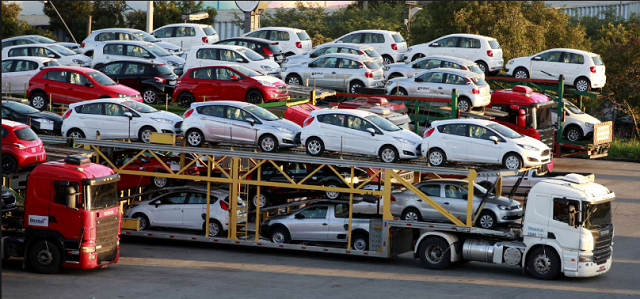Nigeria has become a dumping ground for large number of used vehicles or Tokunbo from United States, Italy and Canada as the government of these countries phase out gasoline cars.
The West Africa oil-producing country imported different used cars valued at N824.58 billion in one year from second quarter of 2020 to first quarter of 2021, analyses of data obtained from the National Bureau of Statistics (NBS) have shown.
Majority of the used vehicles imported during this period came from the United States, Italy, Canada, Belgium and Germany, which have all set new target to reduce green gas emission.
These countries have set different targets for net zero emissions as part of the green industrial revolution and they intend to achieve these by banning the sale of petrol and diesel vehicles.
Every year, these countries sell many of their old cars involved in accidents and those that had failed safety test to predominantly poor countries and Nigeria is a major market for the Tokunbo cars.
The cars would have failed safety, fuel economy and emissions standards in the United States or Europe but are brought into Nigeria by dealers that rely on imported vehicles as their means of livelihood.
According to NBS data, Nigeria imported used vehicles valued at N198.4 billion in the second quarter of 2020, Tokunbo worth N210.05 billion in the third quarter of 2020 and used cars worth N241.91 billion in the fourth quarter of 2020.
In the first quarter of 2021, car dealers imported used vehicles worth N174.22 billion.
READ ALSO: Tax Defaulters To Pay 50 percent Of Disputed Amount Ahead Of Hearing – FIRS
Britain Prime Minister, Boris Johnson, announced a ban on the sale of new petrol and diesel cars and vans from 2030 as part of its commitment to green revolution and to cut emissions to net zero by 2050.
Californian Governor, Gavin Newsom, plans to ban the sale of new gasoline-powered passenger cars and trucks as from 2035.
The Canadian province of Quebec said it will ban the sale of new gasoline-powered passenger cars from 2035.
Germany also started to introduce bans on older diesel vehicles that emit higher amounts of pollutants from late 2018.
Nigeria’s Climate Change Actions
The green house gases from Nigeria increased from 247 million tonnes CO2-related emissions to 347 million tonnes.
Emissions from oil and gas sector were discovered to be the largest contributor to greenhouse gases in the country followed by transport, electricity generation, industry and residential energy consumption, agriculture, forestry and other land use.
Nigeria signed and ratified the Paris Agreement 2017, which means that the government has agreed to tackle climate change.
The Nigerian government promised to reduce its greenhouse gas emissions by 20 per cent by 2030 and with international support, will achieve 45 per cent reduction in greenhouse gases by 2030.
The government pledged to achieve this through new specific policies such as the elimination of kerosene lighting by 2030, greater uptake of mass transit buses and a reduction in the burning of crops.
READ ALSO: Nigeria Urged To Pursue National Bitcoin Standard
In an update to its commitment, the President Muhammadu Buhari this year promised to increase access to off-grid electricity, assessment of green jobs and mainstreaming of gender across all sectors, among others.
FG Reduces Import Levy On Cars
Rather than discourage the importation of fossil fuel-powered cars, the Nigerian government reduced import duty on imported petrol or diesel vehicles this year.
Following the reduction of import duty on imported, car dealers are flooding the market with used vehicles.
One of the amendments in the Finance Act 2020 signed into law by President Muhammadu Buhari in December last year is the reduction of import duty vehicles used for transportation of people and tractors used for farming.
Import duty on tractors was slashed from 35 percent to five percent; duty on mass transit vehicles for the transport of more than 10 persons and trucks from 35 percent to 10 percent, and reduction of import levy on cars from 30 percent to five percent.
The Nigeria Customs Service (NCS) announced the commenced of the implementation of tariff reduction on vehicles In March following a directive from the Ministry of Finance, Budget and National Planning.
The NCS Comptroller-General, Hameed Ali, noted that the new law would help the country to have vehicles meant for transportation with reduced duty for the benefit of Nigerians.
Push Back By Makers Of Brand-New Cars
Automobile assembling companies have kicked against the new tariff, saying it would destroy their investments.
The Chairman, PAN Nigeria Limited, Ahmed Aliyu; Chairman, NAMA, Tokunbo Aromolaran, and other stakeholders alleged that the Customs was out to intentionally kill Nigeria’s automobile industry.
They described the tariff reduction as policy somersault and that Nigeria would soon become a dumping ground for all kinds of vehicles.
This, according to them, will lead to massive lay-off of workers and will further worsen the economic situation in the country.
The Chief Executive of GIG Group, owners of the God Is Good Transport Company, Mr. Ajaere, said the sudden change in policy by the government allegedly without consultation had sent the wrong signal to prospective investors in the sector.
Ajaere while speaking at the Nigeria Economic Summit in Abuja last year narrated a personal experience on the impact of the inconsistencies in government policies in the country.











